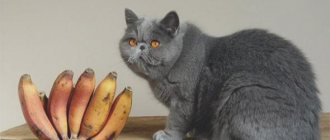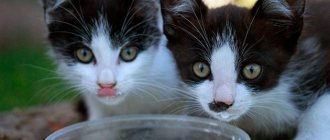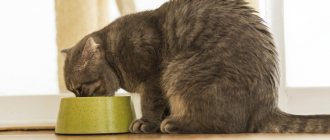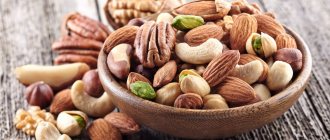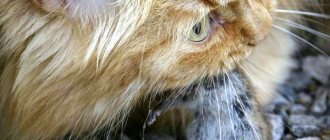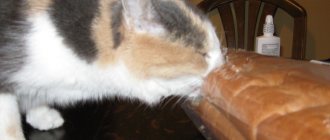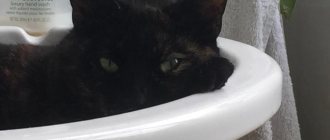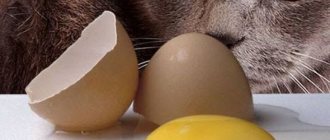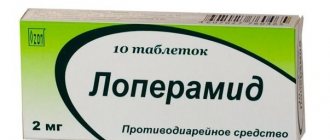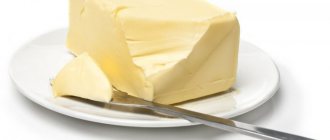Otherwise, we imagine a cat or a cat, then often this image will be combined with a saucer of milk or sour cream. Undoubtedly, felines tend to eat dairy products, and for them they are beneficial. For that matter, the question arises whether it is possible to give cottage cheese to cats.
Consumption of dairy products
In general, for the first six months you should definitely provide your pet with dairy products, in particular fresh dairy products. After this, dairy products may be irregular to some extent in the diet, but they do not change their relevance and benefits.
However, since we are always talking about natural products, milk that is brought at least from the state farm is, in general, fresh. This milk concentrate, which is sold in stores, is not pure milk and contains quite a lot of impurities. Regular disposal of it in a cat's menu can lead to various disorders of the digestive system.
Dairy and fermented milk products in the diet of cats
Nutritionists, veterinarians and cat owners are still hotly arguing about whether cats need such food. There is still no consensus on this matter. But there are still several important points that many experts agree on:
- Kittens up to six months old must be given dairy products. This food is extremely necessary for a growing body.
- As an animal gets older, its digestive tract begins to absorb lactose less well, so it is better to include fermented milk products in a cat's diet.
- Regardless of the type of product, it must be fresh, natural, and free of sugar and artificial flavorings and preservatives.
- The owner should pay attention to the fat content of fermented milk; this figure should not exceed 9%.
Selection of fermented milk products. In order for your pet’s menu to be complete, you need to compose it correctly, selecting suitable fermented milk products, taking into account a number of nuances:
- Kefir - before serving, it must stand for at least 3 days so that the alcohol substances disappear from it (read more about whether cats can have kefir).
- Cream is a high-fat product and is therefore not suitable for feeding cats. Their consumption threatens the pet with digestive upset, and frequent eating will increase the load on the liver.
- Milk remains in the cat’s diet if its body copes well with the absorption of lactose, but it is recommended to give it little by little and infrequently (read more about whether cats can have milk).
- Sour cream contains too much fat, which will lead to obesity in your pet, as well as digestive problems. Occasionally you can pamper your pet with a spoonful of 10% fat sour cream.
- Curdled milk, fermented baked milk, Varenets, yogurt are suitable for feeding mustachioed tabbys. Only if we are talking about natural, fresh products.
- Cottage cheese can definitely be given to cats, twice a week, without sweetening.
When creating a menu for a cat, it is enough to add fermented milk products 2-3 times a week.
And when selecting them, you need to monitor the fat content, ingredients and expiration date.
Basic views
In order to give your pet only what is healthy, you need to buy natural dairy products (these are now easy to find in special stores) and adhere to the following recommendations:
- Kefir needs to sit for about three days in order to absorb all the alcohol.
- If you take milk or cottage cheese, choose a fat content of no more than 9%.
- Cream for cats is a very fatty product.
- It is useful for kittens to give fresh milk, but with age you need to reduce the amount of this product, because the older the cat, the worse lactose is digested.
- Sour cream should also be given rarely and in small quantities; this product is extremely fatty, and you can only give it to cats “as a treat.”
- For adult cats, there is no need to use dairy foods daily, 1-2 times every week or less is enough.
In addition, try to pay attention to the expiration date of the product.
Dangerous properties of cottage cheese
Cottage cheese is an acidic product, so it should not be given to cats suffering from gastritis and peptic ulcers. The product is not recommended for colitis and pancreatitis. A high protein component can provoke an exacerbation of kidney pathologies, so animals suffering from kidney failure should not be given even a drop of cottage cheese.
Due to the high fat content, frequent consumption of cottage cheese can cause an increase in cholesterol levels and weight gain, which entails a lot of negative consequences for the health of your pet.
What are the health benefits and harms of cottage cheese?
In general, cottage cheese is a healthy product for cats. It has a number of advantages that no other product provides:
- contains microelements that are freely absorbed by cats;
- normalizes intestinal microflora;
- provides significant protein availability;
- contains many vitamins;
- promotes proper development of bones and teeth;
- provides phosphorus and calcium;
- Of all dairy products, it is easily digested even in old age.
Well, here again you need to pay attention to the naturalness of the product; sometimes you buy cottage cheese with a long shelf life and a bunch of chemical additives, so it doesn’t have much benefit, unlike a natural product.
Please note (be aware of the possible harm of cottage cheese:
- allergic response;
- inability to be absorbed by the body;
- with high fat content it puts a strain on the liver.
However, among dairy products, sympathy remains one of the best options. In this case, cottage cheese should also be used in relatively small quantities and not overfeed the cat.
How to feed?
When taking care of the pet’s health and introducing cottage cheese into the menu, it is important for the owner to follow the following rules:
Sweet cheeses are contraindicated for fluffies.
- If kefir needs to be kept for three days before feeding, then only fresh cottage cheese is given.
- Before purchasing, you need to pay attention to the expiration date and composition. Various cottage cheese substitutes are not acceptable for kittens.
- You need to start feeding with a small amount, and it is important to monitor the pet’s condition. If diarrhea or feeling unwell occurs, the product should be removed from the diet.
- The fat content of cottage cheese should not exceed 9%. Otherwise, stomach upset, liver disease and obesity may develop.
- It is not recommended to feed your pet a low-fat product, as it will not bring any benefit.
- It is important to follow the serving dosage. The one-time dose should not exceed 30 g per day. The product should be given to kittens 3-4 times a week, and to an adult cat - twice every 7 days.
- You should not give various sweet cheeses and curds. They contain not only large amounts of sugar, but also various chemical additives. Flavorings and flavor enhancers act as poison on the animal's body.
If your pet does not eat cottage cheese, veterinarians recommend adding egg yolk to it. Kittens eat this dish with pleasure. Adding a small amount of sour cream will also improve the taste of the product. However, it should be remembered that in this case the fat content will increase, so the portion should be made smaller. It is not always possible to buy a quality product in a store. Therefore, to ensure the normal functioning of your pet, it is permissible to prepare cottage cheese yourself. To prepare, you will need to take 250 ml of milk, add 3 tbsp. l. kefir and place the mixture in a water bath. Then the composition must be brought to a boil. When the milk has curdled, you will need to strain the mixture through a sieve. This way you will get a high-quality and useful product.
Credo of feeding cottage cheese
Try to avoid sour cottage cheese and, as was said earlier, do not take store-bought, but look for homemade, farm-made one.
Malo-: illiterate, feed cats curd product or sweet curd - such foods are harmful to cats. Before giving the normal amount, try starting with a small portion and look for any allergic reactions. Optimum oiliness is 9% or less. However, it is not appropriate to use completely low-fat cottage cheese, since it does not bring any benefit to cats.
Little kittens need cottage cheese 3-4 times every week in order to provide the body with a normal amount of calcium. For adult cats, the weekly amount of cottage cheese is halved.
If you want to create a current cat treat, there are some options, but you need to take into account the increase in fat content from many similar additives, so you need to watch the quantities. Cottage cheese with yolk will be incredibly tasty for a cat, but that’s all with sour cream. Do not add protein, it is harmful to cats.
Onion and garlic
Even if an animal decides to try these vegetables on its own, it can be very dangerous. The fact is that onions and garlic can provoke hemolytic anemia. In this case, the red blood cells become very weak. The cat may have trouble breathing.
WHO is considering introducing vaccination passports for tourists
Dogs help biologists search for endangered plant species and animal tracks
Waffle cake recipe: a simple dessert that is not embarrassing to serve to guests
Private cottage cheese
To create your own cottage cheese, you will need a glass of sperm and a little kefir, which are mixed and placed in a water bath. During this time, bring the milk to a boil, wait a couple of minutes and strain over a sieve. So, wet curd will appear in the sieve, which you can put in cheesecloth and allow the remaining whey to drain in order to get dry curd. Although it doesn’t really matter to the cats, and they also gobble up brainy cottage cheese very well. The main thing is to monitor the temperature.
You can also leave the milk to sour in the room for 3-4 days, after which you can boil the thickened milk jelly and strain through cheesecloth. This is how curd is made with heating. Without heating, you simply strain the thickened curd and separate the whey from it to get a pure product.
Feeding kittens with natural products
When a kitten appears in the house, many owners do not know how to make the kittens’ nutrition balanced, and most importantly, safe for themselves. It should be noted that the nutrition of kittens and the nutrition of adult British cats are different things, and they should not be confused. We will talk about feeding adult cats with natural products next time, but today we will talk about what natural products can be fed to British kittens.
If you do not trust commercial food and decide to feed your kittens natural food, then you should know that natural food means a certain set of products, which in most cases will have to be purchased specifically for the kitten. Feeding kittens natural products does not in any way imply food from the table - borscht, cutlets, sausage, mojo, etc.
Kitten nutrition can be divided into several product groups:
Meat products
Beef . To strengthen the cheeks, massage the gums, and clean the teeth, it is better to give the kitten raw, well-frozen beef, cut into large pieces. Beef meat is rich in amino acids and contains an optimal ratio of proteins and fats. It is not recommended to give minced meat to kittens, especially ready-made ones.
Veal . If you choose veal for your kitten, buy only from trusted butchers. The fact is that calves for sale are often injected with all sorts of drugs to gain weight, and kittens may develop allergies from eating such meat. You should give veal to your kitten in the same way as beef – in large pieces.
Chicken . If the chicken is domestic or village, it can be given raw. Chicken protein is well digestible, but such meat contains few vitamins and fats, especially chicken breasts. It is better to give chicken meat to kittens from domestic producers and from trusted poultry farms. If you are not sure about the origin of chicken meat, it is better to boil it. Chicken is suitable for regular feeding of kittens, but if you give kittens only one chicken, this can lead to vitamin deficiency and allergies.
Turkey . Turkey meat is coarser and fattier than chicken, so it is suitable for periodic feeding.
Goose and duck contain a lot of fat, so it is better to avoid them.
Rabbit . Croik meat is rightfully considered one of the best types of meat for feeding kittens and adult cats. Perhaps because rabbits are a very common prey of the cat family in natural conditions. Rabbit meat is dietary, and unlike chicken and beef, it practically does not cause allergies in British cats. Rabbit meat can be bought not only at the market, but also in supermarkets in the form of frozen carcasses.
Mutton and lamb . Most English breeders feed their British cats lamb. This is normal for them, because sheep breeding in livestock farming in England is very developed, but from us it is difficult to buy lean and soft lamb for feeding kittens. Lamb meat is very healthy for kittens. It is rich in nutrients and amino acids, and contains almost no fat. You can feed lamb meat to kittens at least every day.
Feathered game : everything that can be caught and shot in the wild - hazel grouse, pheasants, quail, partridges and others. This meat is one of the best sources of protein for a British cat, especially if these birds are wild caught. The meat does not contain antibiotics or hormones, which makes it even more valuable for the nutrition of kittens and adult cats.
By-products – liver, heart, udder, chicken gizzards, chicken necks. You can feed kittens by-products, but be careful. Raw beef liver has a laxative effect, but who knows what it contains, because the liver is a filter of the body that absorbs and processes harmful substances. Pork liver should absolutely not be given - it is too fatty.
You should not let your guard down with chicken gizzards - there have been cases among breeders when cats died from grain poisoned with rat poison, which was contained in chicken gizzards. An udder is an economical option if you really have nothing to feed the kitten. The chicken necks are beaten with a hammer and the kittens are allowed to sharpen their teeth. All these by-products can be given to kittens no more than 1-2 times a week.
Fish and seafood
It is possible, and even necessary, to give British kittens fish, but only sea fish. Fish should be lean and boneless. Navaga, ice cod, cod, and pike perch are well suited for feeding kittens. Fish contains many fatty acids and microelements that are beneficial for a kitten, but frequent consumption can harm the cat’s health because it interferes with the full absorption of vitamins K and B and upsets the balance of phosphorus and calcium in the animal’s body.
You can give your kittens mussels, squid, or octopus once a week. They will be useful for the kitten's developing joints and contain glucosamine. You should be careful with peeled shrimp, as such seafood can cause diarrhea in a kitten.
Dairy products
Kittens can be given 10% cream , but remember that cream strengthens. At three months of age, kittens lose the enzyme that can break down lactose, and in most cases, kittens at this age eat dairy products less readily.
Low-fat cottage cheese is very healthy for kittens . Give preference to 5-9% cottage cheese of such brands as “Agusha”, “Tema”, “Vinny”. British kittens can be given cottage cheese 3-4 times a week.
Dairy products such as kefir, fermented baked milk, yogurt , etc. - with a fat content of no more than 6-8% can be given to kittens at least every day. These dairy products support the natural intestinal microflora and are an additional source of calcium and water for the growing kitten’s body. However, kefir is not suitable for restoring normal microflora after vaccinations or illness in kittens; in this case, kittens are given probiotics lactobifadol or lactobacterin
Vegetables
As for vegetables, kittens can be given zucchini, zucchini, broccoli, spinach, carrots, beets, cauliflower, and lettuce. It is almost impossible to force kittens to eat raw vegetables, so it is better to boil them, grind them in a blender, and mix them into meat dishes. If you manage to teach your kitten to eat vegetables from childhood, consider yourself very lucky.
Porridge
The question of whether to give porridge to a kitten or not remains controversial. I wrote about what kind of cereals can be given to kittens in the article “Feeding British kittens.” If the owners of a British kitten can afford to feed the animal meat and vegetables, then this is quite enough. Sometimes you can add crushed sprouted wheat grains to your food.
Other products
Eggs . Kittens can be given ¼ chicken yolk or one whole quail 2-3 times a week. The yolks contain fats and vitamins that are healthy for the kitten.
Vegetable oil - olive or flaxseed - can be given to kittens to improve digestion, and an additional source of fatty acids, no more than 2-3 drops. Flaxseed oil has the unique property of improving the density of the coat of British cats.
When feeding kittens natural products, vitamins are simply necessary. Please note that this is a complete vitamin complex, and not vitamin supplements or treats. If in doubt, read the article “What vitamins to give a kitten.”
4.5 / 5 ( 33 voices)
